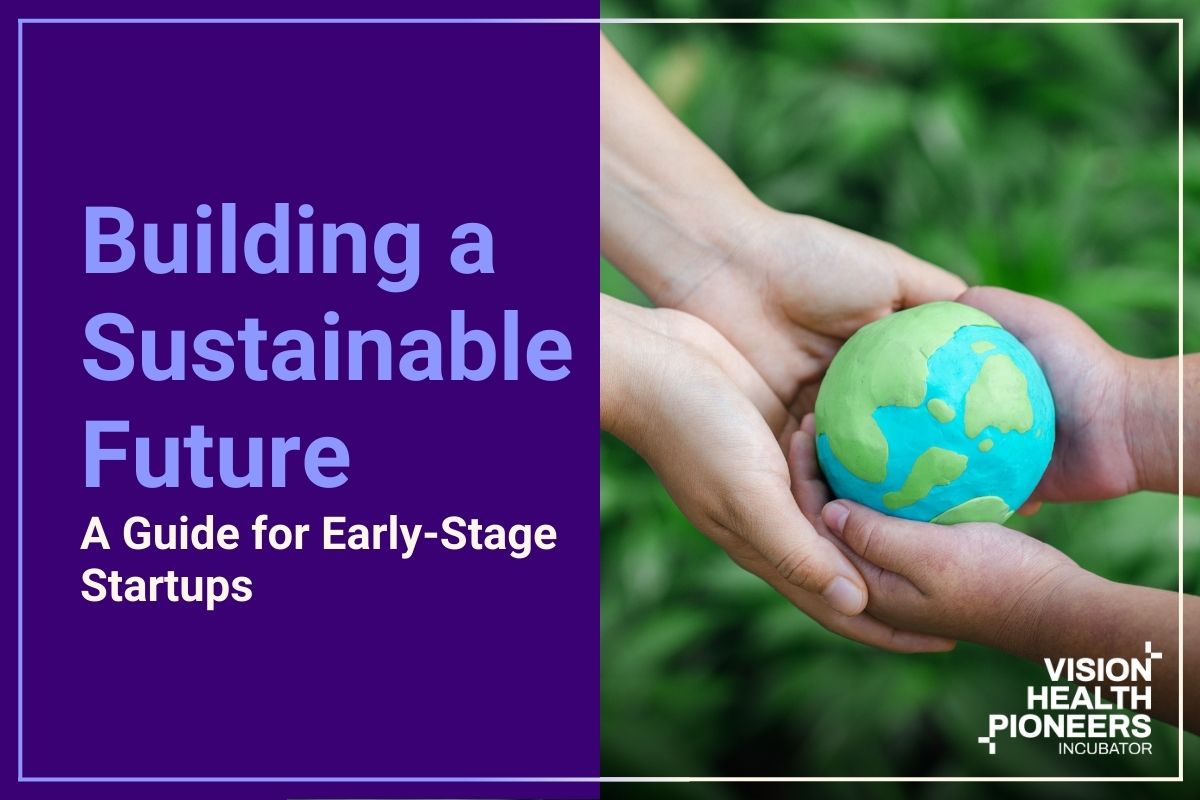
19 Feb Building a Sustainable Future
Sustainability in health tech is more than just a trend—it’s an essential strategy that can drive business growth while reducing environmental impact. With healthcare responsible for about 5% of global CO₂ emissions, early-stage health tech startups have a unique opportunity to integrate sustainability from the ground up. By doing so, they not only contribute to global environmental goals but also unlock a competitive edge in the market, boost cost efficiency, and attract investors. Let’s dive into why sustainability matters for your health tech startup and how you can start embedding it into your operations today.
Why Sustainability Matters for Your Startup
As an early-stage health tech startup, embedding sustainability into your business model early on can be a game-changer. It helps you:
– Avoid retrofitting costs: Incorporating sustainable practices now means fewer costs down the road as regulations evolve.
– Get ahead of regulatory changes: As governments and regulatory bodies increasingly focus on sustainability, early integration helps you stay ahead.
– Enhance brand positioning: Sustainability is a key factor in consumer and partner decision-making, strengthening your brand.
– Attract investors: Sustainability isn’t just good for the planet—it’s also good for your bottom line. Investors are looking for companies with clear sustainability strategies.



Deep Dive: Key Areas of Sustainability in Health Tech
1. Product & Operations
Sustainability in health tech starts with your product design and operations.
Medical Devices & Hardware:
Opt for durable, recyclable, or biodegradable materials. Design your products for repairability and refurbishment, extending their lifecycle and reducing e-waste.
Software & Digital Solutions:
Focus on optimizing energy consumption, especially by working with data centers that prioritize green energy. Minimizing redundant data storage can also help lower your environmental footprint.
Supply Chain:
Partner with suppliers who prioritize ethical and sustainable practices, ensuring that your entire supply chain is responsible and aligned with your sustainability goals.
2. Business Model & Impact
Your business model is where sustainability can truly shine
Telemedicine & Remote Care:
Embrace remote care solutions to reduce travel-related emissions and decrease the strain on healthcare facilities. This not only cuts costs but also helps lower the overall carbon footprint of healthcare services.
Circular Economy Models:
Consider models like leasing, buy-back programs, or device-as-a-service options. These approaches extend the lifecycle of your products and reduce waste.
Social Impact:
Use your tech to improve healthcare access for underserved communities. Develop cost-effective solutions that provide quality care where it’s needed most, making a meaningful social impact.
3. Alignment with UN Sustainable Development Goals (SDGs)
Health tech startups have a unique opportunity to contribute to several of the UN SDGs
SDG 3 – Good Health & Well-being: Enhance healthcare access and improve patient outcomes.
SDG 9 – Industry, Innovation & Infrastructure: Foster innovation through smart health devices and digital solutions.
SDG 12 – Responsible Consumption & Production: Optimize resource use, reduce waste, and promote responsible production practices.
SDG 13 – Climate Action: Help reduce the carbon footprint of healthcare services, advancing climate action.


Building an Investor-Ready Sustainability Strategy
A solid sustainability strategy can make your startup more attractive to investors, especially as they increasingly focus on Environmental, Social, and Governance (ESG) factors.
– Regulatory Awareness: Stay informed about ESG regulations, which are continuously evolving. Understanding these will help you avoid compliance issues.
– Measurable Impact: Investors love data. Track key sustainability metrics such as waste reduction, energy efficiency, and telehealth adoption to demonstrate tangible impact.
– Competitive Edge: A robust sustainability strategy doesn’t just improve your operations; it helps you stand out from competitors. Showcase cost savings, regulatory compliance, and efficiency improvements to build your brand.
Taking Action on Sustainability
Sustainability isn’t a checkbox to tick off—it’s a fundamental business driver. By integrating green practices into your startup’s DNA, you position your company as forward-thinking, resilient, and attractive to investors. Here’s how to get started:
– Assess Your Impact: Identify areas in your operations, product lifecycle, or supply chain where you can reduce waste, energy use, or emissions.
– Track & Report: Measure and report on sustainability metrics that matter to investors and healthcare partners alike.
– Leverage Partnerships: Work with sustainable suppliers, green data centers, and impact-driven investors to help embed sustainability into every aspect of your business.
Ready to take your sustainability strategy further? Check out this guide, a Step-by-Step Guide, for in-depth insights on integrating environmental and social factors into your business model.
Sustainability isn’t just about reducing your carbon footprint—it’s about building a resilient, future-ready business that’s poised for long-term success. By starting with these actionable steps, you’ll not only make a meaningful impact on the planet but also set your health tech startup up for success in an increasingly green-conscious world.



